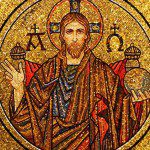 The Adventurous Lectionary for December 2, 2012
The Adventurous Lectionary for December 2, 2012
The First Sunday of Advent
Jeremiah 33:14-16
Psalm 25:1-10
I Thessalonians 3:9-13
Luke 21-25-36
As a high school senior in 1969, one of my favorite songs was Chicago Transit Authority’s (aka Chicago) “Does Anybody Really Know What Time it Is?” I can still remember the words:
Does anybody really know what time it its?
Does anybody really care?
If so I can’t imagine why
We’ve all got time enough to cry/die.
Advent asks us to ponder the question, “What time is it? – What time is it in your life? In the life of the nation? In the mission of the church? In planetary history? Do you really know – or care – what time it is?” While some moments are more definitive than others in our lives and in the world, I challenge the dualism implied in contrasting “kairos” and “chronos” time. Differentiating chronos and kairos implies that clock time is only occasionally revelation-time and that kairos time is somehow spiritually and metaphysically set apart from the rest of our lives.
Do you recall the wonder and pain that that Emily – one of the protagonists of Thornton Wilder’s play Our Town – feels when she asks to return from the land of the spirits to experience one day of her life over again? She exclaims, “Oh, earth, you’re too wonderful for anybody to realize you. Do any human beings ever realize life while they live it — every, every minute?” Advent is about holistic living and awakening to knowing that Christ comes to us in every moment. Every moment is a “second coming.” Every moment the realm of God draws near. Every moment is a kairos moment in which Christ is born in the “quotidian mysteries” (Kathleen Norris) of our lives.
Frankly, the passage Luke 21 has done more harm than good in Christian history. Readers have focused on verses 25-28 in all their apocalyptic glory, assuming that they could reckon the signs of the times and that they would be among God’s chosen. What mischief and malfeasance these passages cause when we they inspire us to world denial, passivity before God, or delight at knowing the “bad news is the good news.” The perceptive preacher must deal with these passages and their apocalyptic interpretations to counter the end of the world scenarios promulgated by end-times preachers and Mayan calendar soothsayers. In contrast to earth-denying visions of life, our business is here: to delight in the wonderful earth, moment by moment, and bring forth beauty in this good earth. Yes, it is true that we would be unable to drive our cars or cook dinner if every moment was “Pixar” mystical, and yet, if God is omnipresent, then every moment is as window into the divine. We can marvel at the growth of the fig tree – amazed at its blossoms and delicious fruit and discover we and those around us are blossoming and giving forth fruit every moment of our lives. Mysticism – the practice of the presence of God in the domestic as well as the dramatic – is at the heart of the Advent spirit.
Stay awake, be alert, “be on your guard that your hearts are not weighed down with dissipation and drunkenness and the worries of this life, and that day does not catch you unexpectedly like a trap.” Knowing what time it is – and practicing an Advent spirituality – means that we look for holy moments in the small and large events of life. There is a crisis – a moment of decision – and opportunity in every encounter. We can notice the tears of a child or rejoice in her or his playing with a puzzle or turn away fixated on our agendas. We can look into the eyes of our beloved or see everything as routine. A sunrise can just be an annoying reminder that we have to go to work or it can be, for us, the face of God. The newspaper can fill us with dread or inspire us to action to become partners in God’s shalom.
Now a little apocalypse goes a long way, but not in the pathways of the televangelists. Apocalyptic thinking should awaken us to the eschatology of each moment, rising and perishing, but in its transitoriness, the opportunity to experience holiness. “This is the day God has made” and we are accountable for our openness to God’s inspiration. For early Christians, Advent and Lent mirrored each other as opportunities for spiritual reflection. What do we need to reflect upon today? What time is it for us? Where is God speaking in the many events of life? We don’t need to be Scrooge-like to experience an Advent spirituality. Advent spirituality does not mean imply turning our backs on the Christmas season or banning Christmas carols from worship. As the holiday song says, “we need a little Christmas.” But, how drunk we can become on Black Friday sales, on consumption, and thinking we can make someone happy with a present under the tree when real happiness comes from our presence – listening, seeing, loving, touching.
Jeremiah speaks words of hope. A branch, full of blossoms and eventually fruit, is bursting forth from an arid and broken nation. Life abounds beneath the current uncertainties. Life is emerging quietly like the fig tree’s growth and we can open our eyes to the deep down hopefulness of life or live in despair. There is a future – God has a vision for you, for good not evil, for a future and hope. This future is not predestined or automatic, but the invitation to become the future that we dream about, incrementally embracing life’s fruitfulness and tending to growing things all around us.
The words of Thessalonians speak of this same gentle providence that is nurtured by prayer and gratitude. The author is overcome with thankfulness for God’s presence in the life of the little church in Thassalonika. His gratitude is undergirded by a prayerful spirit. Indeed, the constancy of his prayers may be the source of his thanksgiving and his ability to experience holiness in little congregations. Prayerfulness awakens his vision to God’s providential care, which does not determine, but invites us to be companions on a holy adventure.
There is no need to be Scrooge-like in the pulpit or liturgy. Let there be solemnity and spiritual asceticism, and let that be balanced by joyfulness, which comes from being awakened to God’s presence. Drink deeply the Advent spirit of watching and waiting, but open the windows to celebrating this day and the birth of God’s child everywhere. Chant “O Come, O Come, Emmanuel” as a wakeup call, inspiring true appreciation of Christmas incarnations right here and now.













